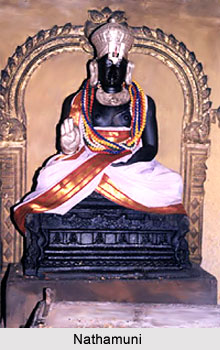 Nathamuni, also known as Shriman Nathamunigal, was a Tamil poet saint and a scholar who existed during the period between 900 Century CE and 950 Century CE. He established the Sri Vaishnava tradition in the Tamil country. According to the history of Sri Vaishnava tradition, Acharya Shriman Nathamuni was born in Aani Anusham star, in Kaattumannargudi in a village known as Viranarayana, or Veera Narayana Puram, located near Kattumannarkoil, in the Chola kingdom. Nathamuni`s father was named Isvarabhatta and the Vaishnava saint poet had a son named Isvaramuni. Based on historical accounts, it is ascertained that Acharya Shriman Nathamunigal lived during the late 9th century or early 10th century. He was identified with several other names such as Sottai Kulaththu Arasar and Sadamarsana Kula Tilakar. Nathamuni is most renowned for collecting and compiling the four thousand hymns of the Alvars in the work titled Divya Prabandham or Naalayira Divya Prabandham in Tamil language. Acharya Shriman Nathamuni also composed 3 other literary works namely Yoga Rahasya, Nayaaya Tattva and Purusa Ninnaya.
Nathamuni, also known as Shriman Nathamunigal, was a Tamil poet saint and a scholar who existed during the period between 900 Century CE and 950 Century CE. He established the Sri Vaishnava tradition in the Tamil country. According to the history of Sri Vaishnava tradition, Acharya Shriman Nathamuni was born in Aani Anusham star, in Kaattumannargudi in a village known as Viranarayana, or Veera Narayana Puram, located near Kattumannarkoil, in the Chola kingdom. Nathamuni`s father was named Isvarabhatta and the Vaishnava saint poet had a son named Isvaramuni. Based on historical accounts, it is ascertained that Acharya Shriman Nathamunigal lived during the late 9th century or early 10th century. He was identified with several other names such as Sottai Kulaththu Arasar and Sadamarsana Kula Tilakar. Nathamuni is most renowned for collecting and compiling the four thousand hymns of the Alvars in the work titled Divya Prabandham or Naalayira Divya Prabandham in Tamil language. Acharya Shriman Nathamuni also composed 3 other literary works namely Yoga Rahasya, Nayaaya Tattva and Purusa Ninnaya.
Nathamuni as a Vaishanava Saint
Shriman Nathamuni travelled to various Divya Desams such as Puri, Vrindavan, Bengal and Mathura, during his long pilgrimage. When he came back to his own village, Nathamunigal met few Vaishnava poet saints, who were from the Western India. They sang 10 hymns that were composed by Nammalvar, one of the 12 Alvar saints. Later Nathamuni came in contact with Madhurakavi Alvar, the disciple of Nammalvar, and enquired him about the availability of the verses of Nammalvar. Madhurakavi Alvar informed him that Nammalvar attained salvation after writing an extensive book of devotional verses in Tamil, devoted to Lord Vishnu. But due to some misconception, the local people threw the poetic work of the Alvar saint into the Tamraparani River. But one page was protected by a person who admired the verses and chanted them. That page contained only 10 verses of the work of Nammalvar. Thus Acharya Shriman Nathamuni obtained only the 10 hymns that were available. Subsequently, he approached a skilled manual worker, who offered Nathamuni with the entire text of Nammalvar`s work. This work was named Tiruvaymozhi
Nathamuni, along with his 2 nephews, Kilaiyagattalvar and Melaiyagattalvar, brought the hymns together and set them to music in the Vedic approach. Since then, these verses were recited in various temples and were considered as Tamil Veda.
Nathamuni as a Poet and Philosopher
Acharya Shriman Nathamuni is most noted for his compilation of the Naalayira Divya Prabandham. Divya Prabandham is an anthology of 4,000 verses in Tamil language, composed by the 12 Alvars before 8th century AD. It was compiled by Nathamuni during the 9th century- 10th century. He taught the verses to his 2 nephews at Srirangam and also introduced the devotional hymns at the Sri Ranganathaswamy Temple, also known as Sri Ranganatha Svami Temple, at Srirangam as a daily ritualistic service. He was the administrator at Sri Ranganathaswamy Temple. He is also considered as the founder of the Araiyar Sevai. It is said that Kambar, a Tamil poet, recited the Ramavatharam in order to attain his approval for including it in the holy grounds.
Other than these, Acharya Shriman Nathamuni also composed three works which have contributed significantly in the Tamil literature. These works include Nayaaya Tattva, Purusa Ninnaya and Yoga Rahasya. Nathamuni was also a proponent of Yoga and practiced the Yoga of eight accessories, known as Ashtanga Yoga.



















